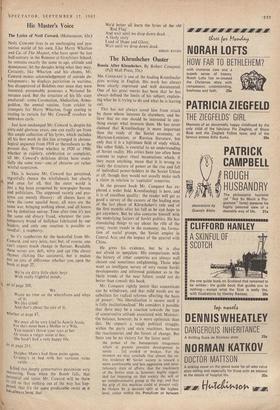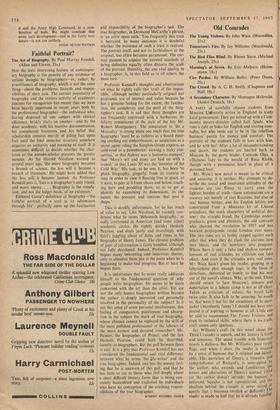Professor Kendall's thoughts and observations on what he rightly calls
this 'craft of the impos- sible,' although neither particularly original nor profound, are of interest and value because he has a genuine feeling for the extent, the fascina- tion, the complexity and the peril of the biog- rapher's task. It is sad that these thoughts are too frequently expressed with a barbarous in- felicity reminiscent of the style of the late Mr. Robert Montgomery. The temptation to `do a Macaulay' is strong when one reads that the true biographer 'must be as ruthless as a board meet- ing smelling out embezzlement, as suspicious as a secret agent riding the Simplon-Orient express, as cold-eyed as a pawnbroker viewing a leaky con- certina,' or that Aubrey was `a Suetonius manqué,' that 'More's wit and irony are laid on with a trowel,' or that Louis XI was the 'inventor of the Cold War.' His task, as he sees it, has been `to pluck biography, gingerly, from its context in time in order to view it floating free in space, as it were, to peer at it from above and below, touch- ing here and prodding there, so as to get at identity by examining its dimensions, its ele- Ments, the pressure and tensions that give it shape.'
This is doubly unfortunate, for he has much of value to say. Like Nicolson, he roundly con- demns what he terms 'Behemoth biography,' so sadly reverenced in American (and some other) academic circles. He rightly derides Hesketh Pearson, and deals justly and revealingly with Edel's juggling about of dates and times in his biography of Henry James. The chronic problem of gaps of information is fairly handled, although not fully developed. Indeed, Professor Kendall begins many interesting and important themes, only to abandon them just at the point when he is beginning to make real progress. But at least he begins them.
It is unfortunate that he never really addresses himself to the fundamental question of why people write biographies. He seems to be more concerned with the art than the artist. Yet are not the only honest biographies written because the author is deeply interested and personally involved in the personality of the subject? Is it not this sense of acute personal involvement, this feeling of compassion, puzzlement and absorp- tion in the subject the mark of true biography, whose absence cannot be replaced by the skill of the most polished professional or the labours of the most earnest and devoted researcher?. Mr. Painter, the biographer of Proust. and the late Hesketh Pearson, could both be described, loosely, as biographers. But the gulf between them is vast. It is a pity that Professor Kendall has not considered the fundamental and vital difference between what he terms 'the ;ife-writer' and the true biographer. Indeed, one has the uneasy feel- ing that he is unaware of this gulf, and that he has little to say to those who feel deeply about a most difficult literary form that is being con- stantly bastardised and exploited by individuals who have no conception of the crushing respon- sibilities of the true biographer.































 Previous page
Previous page